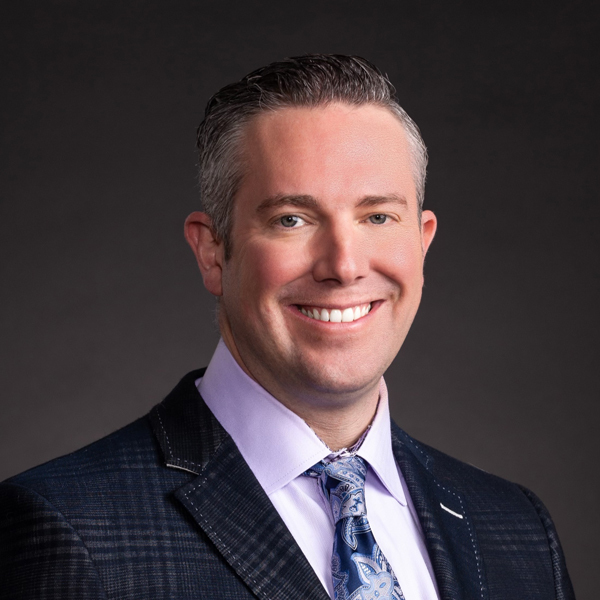“Pushing the envelope to improve patient care,” The Steadman Clinic’s Dr. Michael Gallizzi performs his 300th robotic spine surgery

Dr. Gallizzi has advanced his application of robotics to safely perform more complex procedures, decompressions and cervical spine surgeries
VAIL, Colo. – Robotic and endoscopic spine surgeon Dr. Michael Gallizzi has reached yet another milestone in his surgical career, performing his 300 th robotic surgery on April 2 in Vail, Colo. It marked the third straight April that Dr. Gallizzi completed a milestone number of procedures, as he performed No. 100 in April 2022 and No. 200 a year ago in April 2023.
“It’s really been a great progression,” said Dr. Gallizzi. “The biggest difference from the first 200 to the next 100 is that we started expanding the application of the robot beyond just placing pedicle screws for the low back or lumbar spine. We expanded its use to safely perform even more complex surgeries, decompressions, and cervical spine surgeries.”
Robotic surgery is relatively new, but its uses are expanding, and Dr. Gallizzi is one of the leaders in the advancement of the use of robotics in spine surgery.
“The biggest use originally was targeting pedicle screws in the low back and thoracic spine,” Dr. Gallizzi shared. “I was one of the first in the world to use it to percutaneously place pedicle screws in the cervical spine.” He demonstrated this technique at the 8th annual Seattle Science Foundation’s Robotics Course last December.
The progression of new uses for the robotic tool has not only made some surgeries safer but also less time consuming and certainly less invasive for the patient.
Dr. Gallizzi notes how he has greatly improved the effectiveness of some of his revision work on patients who have undergone previous neck and spine surgeries.
“A large number of patients I treat have had previous procedures that packed a lot of bone in the back of the spine to help it fuse. But when done that way, performing a revision decompression was very difficult because the anatomy of the patient was artificially changed.
“You would then have this whole wall of bone from their previous surgery that you have to now go through to get to the neural elements. With the robot, I’ve been able to plan trajectories to resect unnecessary bone away from the nervous structures using the robotic navigation tool to mill out a very safe area away from critical structures. I am essentially using the robot to help define the boundaries of the area I need to decompress. So now it's almost like connecting the dots so that I can, by hand, perform the delicate work around the spinal cord and nerves to complete the procedure in a safer and less destructive way.”
What lies ahead for Dr. Gallizzi and his specialty?
“The application in the next 100-and-beyond robotic surgeries will continue to expand on the use cases we're finding for the robotic technology,” said Dr. Gallizzi. "Among potential advancements is the integration of an endoscope through the robot, particularly in cases where patients have undergone fusion procedures but experienced cage migration into the spinal canal. Utilizing robotic guidance alongside the scope allows for precise targeting and resolution of such issues."
Dr. Gallizzi describes himself as a spine surgeon who “pushes the technology envelope.” It is that trait that he believes caught the attention of The Steadman Clinic when it was searching for a new spine specialist to join its team.
“I think they saw a doctor doing what everybody else on their staff had done in their respective fields,” added Dr. Gallizzi. “Whether it was the legendary Dr. Steadman with his ‘microfracture’ and ‘healing response,’ or (Dr.) Marc Philippon, (Dr.) Peter Millett, (Dr.) Tom Hackett and Dr. Tom Clanton that were basically pioneering hip surgery, shoulder surgery, knee surgery and foot and ankle surgery. And hip surgeon (Dr.) Joel Matta pioneering a method that was even named after him: the Anterior Advantage Matta Method.
“It's just great to be able to be part of that camaraderie of people who have been pushing the envelope to improve patient care.”
With that in mind, Dr. Gallizzi has teamed with fellow spine, neck and back surgeon Dr. Sonny Gill to create a spine surgery fellowship as part of the highly respected fellowships at Steadman Philippon Research Institute (SPRI).
"Dr. Gill and I worked together to meticulously craft the guidelines for our new spine fellowship at SPRI," Dr. Gallizzi shared. "We are enthusiastic about the prospect of selecting a qualified candidate this year. In response to the query of how to cultivate more spine surgeons proficient in robotic techniques, this fellowship serves as a direct avenue for training. Our goal in introducing this training to the esteemed Steadman fellowship program is to personally provide comprehensive training opportunities for the next generation of spine surgeons.”
For further information, contact Lynda Sampson, vice president of external affairs at The Steadman Clinic/SPRI (lsampson@sprivail.org).
VAIL, Colo. – Robotic and endoscopic spine surgeon Dr. Michael Gallizzi has reached yet another milestone in his surgical career, performing his 300 th robotic surgery on April 2 in Vail, Colo. It marked the third straight April that Dr. Gallizzi completed a milestone number of procedures, as he performed No. 100 in April 2022 and No. 200 a year ago in April 2023.
“It’s really been a great progression,” said Dr. Gallizzi. “The biggest difference from the first 200 to the next 100 is that we started expanding the application of the robot beyond just placing pedicle screws for the low back or lumbar spine. We expanded its use to safely perform even more complex surgeries, decompressions, and cervical spine surgeries.”
Robotic surgery is relatively new, but its uses are expanding, and Dr. Gallizzi is one of the leaders in the advancement of the use of robotics in spine surgery.
“The biggest use originally was targeting pedicle screws in the low back and thoracic spine,” Dr. Gallizzi shared. “I was one of the first in the world to use it to percutaneously place pedicle screws in the cervical spine.” He demonstrated this technique at the 8th annual Seattle Science Foundation’s Robotics Course last December.
The progression of new uses for the robotic tool has not only made some surgeries safer but also less time consuming and certainly less invasive for the patient.
Dr. Gallizzi notes how he has greatly improved the effectiveness of some of his revision work on patients who have undergone previous neck and spine surgeries.
“A large number of patients I treat have had previous procedures that packed a lot of bone in the back of the spine to help it fuse. But when done that way, performing a revision decompression was very difficult because the anatomy of the patient was artificially changed.
“You would then have this whole wall of bone from their previous surgery that you have to now go through to get to the neural elements. With the robot, I’ve been able to plan trajectories to resect unnecessary bone away from the nervous structures using the robotic navigation tool to mill out a very safe area away from critical structures. I am essentially using the robot to help define the boundaries of the area I need to decompress. So now it's almost like connecting the dots so that I can, by hand, perform the delicate work around the spinal cord and nerves to complete the procedure in a safer and less destructive way.”
What lies ahead for Dr. Gallizzi and his specialty?
“The application in the next 100-and-beyond robotic surgeries will continue to expand on the use cases we're finding for the robotic technology,” said Dr. Gallizzi. "Among potential advancements is the integration of an endoscope through the robot, particularly in cases where patients have undergone fusion procedures but experienced cage migration into the spinal canal. Utilizing robotic guidance alongside the scope allows for precise targeting and resolution of such issues."
Dr. Gallizzi describes himself as a spine surgeon who “pushes the technology envelope.” It is that trait that he believes caught the attention of The Steadman Clinic when it was searching for a new spine specialist to join its team.
“I think they saw a doctor doing what everybody else on their staff had done in their respective fields,” added Dr. Gallizzi. “Whether it was the legendary Dr. Steadman with his ‘microfracture’ and ‘healing response,’ or (Dr.) Marc Philippon, (Dr.) Peter Millett, (Dr.) Tom Hackett and Dr. Tom Clanton that were basically pioneering hip surgery, shoulder surgery, knee surgery and foot and ankle surgery. And hip surgeon (Dr.) Joel Matta pioneering a method that was even named after him: the Anterior Advantage Matta Method.
“It's just great to be able to be part of that camaraderie of people who have been pushing the envelope to improve patient care.”
With that in mind, Dr. Gallizzi has teamed with fellow spine, neck and back surgeon Dr. Sonny Gill to create a spine surgery fellowship as part of the highly respected fellowships at Steadman Philippon Research Institute (SPRI).
"Dr. Gill and I worked together to meticulously craft the guidelines for our new spine fellowship at SPRI," Dr. Gallizzi shared. "We are enthusiastic about the prospect of selecting a qualified candidate this year. In response to the query of how to cultivate more spine surgeons proficient in robotic techniques, this fellowship serves as a direct avenue for training. Our goal in introducing this training to the esteemed Steadman fellowship program is to personally provide comprehensive training opportunities for the next generation of spine surgeons.”
For further information, contact Lynda Sampson, vice president of external affairs at The Steadman Clinic/SPRI (lsampson@sprivail.org).

